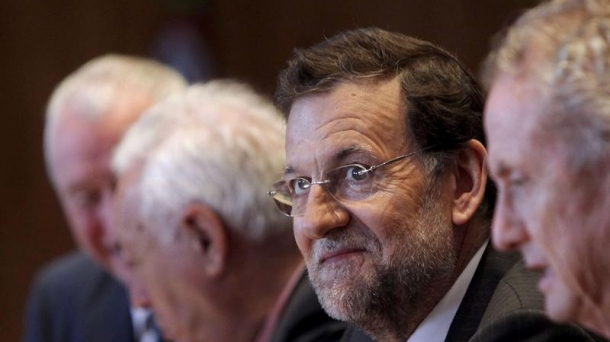news
To steady ailing sector
Spain takes over Bankia, takes indirect 45 pct stake
Reuters
Madrid
The government earlier this week forced out Bankia Chairman Rodrigo Rato and replaced him with Jose Ignacio Goirigolzarri, a prominent ex-banker from the Basque region.
-

Spain's government effectively took over Bankia after days of market anxiety. Photo: EFE
Hoping to put an end to a four-year banking crisis, Spain's government effectively took over Bankia SA, one of the country's biggest banks, late on Wednesday after days of market anxiety over the lender's viability.
The centre-right government of Prime Minister Mariano Rajoy told Spaniards the banking sector was safe and said more measures to strengthen ailing lenders would come on Friday.
The sector has already been through three major overhauls since a building and property market crash in 2008, which left lenders with what is now about 184 billion euros ($238 billion) in toxic assets including repossessed housing complexes that stand empty.
Holding 10 percent of deposits in Spain's banking system, Bankia is by far the largest of eight banks that the government has rescued over recent years. "Bankia is a solvent entity that continues absolutely normal operations and its clients and depositors have no cause for concern," the central bank said in a statement.
The public seems to have accepted the government's assurances and so far there have been no signs of any deposit runs in Spanish banks.
Inside a Bankia branch in Madrid there was a normal flow of about eight clients on Thursday morning. "I'm not worried. I know my money is safe ... Maybe people with more money don't see it that way," said Fernando Hernando, 42, an interior designer, who was in the bank on regular business.
For years banking analysts and critics have pushed Spain to go further in recognising its banking troubles, which threaten to undermine the euro currency zone if the rescue is so
expensive that it breaks Spain's public finances.
"Bankia has ended up in state hands because nobody accepted the reality of its financial situation in time," said an editorial in El Mundo newspaper, which is generally sympathetic to the ruling People's Party.
Bankia's exposure to troubled real estate assets, including loans at risk of default and repossessed properties from bankrupt borrowers, is some 32 billion euros. "Better late than never," said Expansion newspaper of the government's move, saying both the central bank and politicians had let the problem get out of hand.
Rising defaults
With the economy in a second recession since 2009 and one in four workers jobless, banks face rising loan defaults beyond those connected with the burst construction bubble.
Spain will demand on Friday that banks set aside another 35 billion euros against loans to the ailing building sector - above and beyond the 54 billion they are already provisioning this year - raising the possibility more public cash will be needed to rescue the country's lenders.
The government is also expected to detail a scheme to remove toxic assets from banks' books and sell them off.
La Vanguardia newspaper said the European Commission had recommended to Spain a panel of independent experts to audit the banks.
Rajoy forced the banks to recognise huge losses in a decree passed on February and insisted at the time that no more public funds were needed for the sector.
But he had to make a U-turn as doubts persisted about Bankia, with the International Monetary Fund pointing to its vulnerability in a recent report and auditors Deloitte declining to sign off the lender's 2011 accounts.
The government earlier this week forced out Bankia Chairman Rodrigo Rato, a former economy minister from the ruling party, and replaced him with Jose Ignacio Goirigolzarri, a prominent ex-banker from the Basque region.
Rato took Bankia, an amalgamation of seven smaller savings banks, public last year in an effort to increase the entity's capital and its transparency. Its stock price has dropped more than 40 percent since then.
European stocks have fallen in recent sessions as investors fret about Greece's political deadlock as well as the state of the Spanish bank sector. Bankia shares were down 1.5 percent at Thursday's open at 2.083 euros.
top stories



-
news
New anti-eviction law
Andalucia begins proceedings to seize confiscated houses from banks
-
news
London attack
British police ponder conspiracy after soldier murder
-
Sport
Giro d'Italia
Nibali tightens grip on overall lead after stage victory
© EITB - 2024 - Privacy Policy - Legal disclaimer - Cookie Policy - Cookie settings


